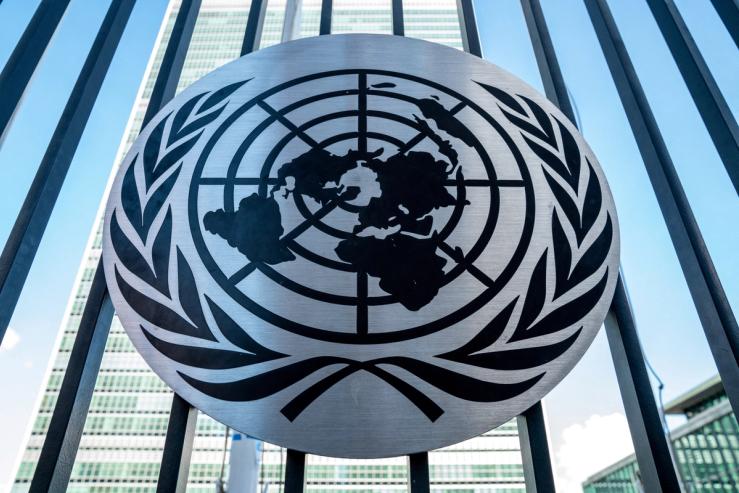The News
World leaders will gather in New York on Monday for the annual meeting of the United Nations General Assembly under a cloud of dark jokes: The UN is “Siberia on the East River,” remarked the longtime UN observer Richard Gowan. One former US diplomat compared it to Elba, the island where Napoleon spent his first exile.
The butt of these jokes is Mike Waltz, the ambitious former congressman and national security adviser who was unceremoniously demoted to Turtle Bay in April for a series of sins that add up to not being MAGA enough. Waltz was confirmed Friday, just in time, to a post that nobody in Washington knows what to do with. President Donald Trump has yet to speak with Secretary General António Guterres, and the only recent US action at the institution came with its sixth veto of a resolution calling for a ceasefire in Gaza last week.
But don’t count Waltz out — or totally rule out the possibility that Trump takes a crack at disrupting the UN, as he has many other institutions. This isn’t, to say the least, an institutionalist White House. It’s driven by personality and, to a degree, ideology. And in that vein, if Napoleon could get out of Elba, Waltz could find the sun of Trump’s favor shining on him again.
Among the factors working for Waltz and his new team: He remains close to White House chief of staff Susie Wiles, an administration official noted; and the new UN ambassador for political affairs, Jennifer Locetta, is a longtime Wiles aide. On top of that, Morgan Ortagus, a counselor to the mission and deputy Middle East envoy, has deep relationships in Trump’s orbit and a reputation for bridging divides between Republican factions.
Waltz, one administration official said, will also regain his place in Trump’s Cabinet. A White House spokesman didn’t immediately respond to an inquiry on the subject and Waltz didn’t respond to an inquiry sent via iMessage. (His Florida mobile number isn’t on Signal.)
Trump also has a fondness for the new deputy ambassador, former Fox News host Tammy Bruce, who is moving over from what was seen internally as an unsuccessful run at the State Department.
“We’re going to change the place, like we did to NATO,” the optimistic administration official told me, referring to the UN.
That would, to be fair, be quite a surprise if it happens.
The US seat at the UN has turned into an occasionally vital perch for major diplomatic figures — Richard Holbrooke, Madeleine Albright, and John Negroponte among them — who operated at the center of a swirl of diplomacy, socializing, and resulting media leaks. (Nobody in Washington ever thought to blame the envoy, but they were on all the calls.)
When Kelly Craft, Trump’s most recent ambassador, lost the post’s sometime Cabinet-level status, a downgrade traditional in Republican administrations. Joe Biden’s ambassador, Linda Thomas-Greenfield, had Cabinet rank but was not part of his inner circle.
Waltz will have to navigate the reality that, this time around, the UN has been a true afterthought.
“I can’t think of a time when the UN was seriously discussed during transition or the first 100 days,” said one former US official who was involved throughout both periods of the administration.
Trump first offered the ambassadorship to a political ally, Elise Stefanik, but withdrew it so she could keep her Upstate New York House seat.
“They don’t seem to have thought it through,” the former UN ambassador and current Trump target John Bolton said. “I’m not sure they know enough to think it through.”
In this article:
Know More
To the extent the Trump administration maintains a glimmer of interest in the UN, it’s in the Security Council’s permanent five members, the sort of group you can do business with. The administration would rather deal with France directly in New York, for example, than through a slurry of European policy in Brussels.
That view is shared by a major US adversary, noted Gowan, who leads the UN arm of the International Crisis Group.
“To the Russians, the UN is a five-member organization. It just happens to have some other countries in it,” he said. “They see the Trump administration as kindred spirits when it comes to the UN: not bothered by the human rights stuff, not that interested in what little powers say about global affairs.”
(This doesn’t mean the US and Russia are finding much common ground inside the UN, despite a few headlines: They clash regularly on Iran, and Russia supported last week’s Gaza resolution.)
China, meanwhile, is “ready to step in,” said Chris Lu, who was UN ambassador for management and reform under Biden. “At the UN, money buys positions, people.”
“Now that the United States has stopped showing up, [Chinese President Xi Jinping] sees an accelerating opportunity,” two Biden-era State Department officials, Jeffrey Prescott and Julian Gewirtz, write in a forthcoming article in Foreign Affairs.
A new Chinese “Global Governance Initiative” might “prove unexpectedly attractive to smaller countries that rely on the UN system for their foreign policies,” they write.
Republicans, including Trump, have traditionally pressed the UN to reform its sluggish bureaucracies, and Guterres is pushing a reform program aimed in part at mollifying the US, which remains the institution’s biggest donor.
But the Trump administration’s indifference to the UN isn’t an oversight. It reflects a wide-ranging hostility to a category of multilateral 20th-century institution. As Semafor reported last week, the administration’s new global health strategy is aimed at using public health spending to boost bilateral relationships, potentially marginalizing lower-profile multilateral organizations like Africa’s CDC.
Ben’s view
If Waltz, Ortagus, and company find their way back into the center of US foreign policy, it’ll be in Washington, not New York.
For Trump, Washington has already replaced the UN for what had been some of its most basic diplomatic purposes. Trump may not have spoken to Guterres, but he has held White House celebrations of peace deals between Rwanda and the Democratic Republic of the Congo, and Azerbaijan and Armenia. These are entries in his aspirations for a Nobel Peace Prize.
The president’s new, transactional bilateralism revolves around freewheeling global diplomacy that’s now more likely to be conducted in a Georgetown club with Steve Witkoff or the tech czar David Sacks than it is with career diplomats.
That’s a Washington game, and New York has never been more marginal.
Room for Disagreement
Is China actually trying to take over the UN? The Crisis Group’s Gowan doesn’t buy it:
“The China bogeyman is something which Democrats and moderate Republicans use to try to scare the administration into taking the UN seriously,” he said. “They do see an opening with the US refusing to pay its dues, but they’re not making a big move. The Chinese won’t offer the level of funding that the US was providing, because they are quite clear-eyed about which bits of the UN are useful to them.”
Notable
- Waltz’s Republican pedigree may have really been “what did him in,” David Ignatius wrote in The Washington Post shortly after the Signal messaging scandal broke: In Trump’s Washington, “Waltz was an anchor to the traditional Republican world of foreign policy.”
- “While no entity can fully make up for the absence of the US government, the UN needs to radically rethink its approach to an often-forgotten party: the private sector,” Lu writes of the new status quo for PassBlue.


